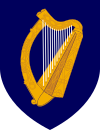
The government agencies in Sweden are state-controlled organizations that act independently to carry out the policies of the Government of Sweden. The ministries are relatively small and merely policy-making organizations, allowed to monitor the agencies and preparing decision and policy papers for the government as a collective body to decide upon.

The Garda Síochána is the national police and security service of Ireland. It is more commonly referred to as the Gardaí or "the Guards". The service is headed by the Garda Commissioner, who is appointed by the Irish Government. Its headquarters are in Dublin's Phoenix Park.
The public service of Ireland refers to the entirety of public administration within the state government apparatus. The Department of Public Expenditure, National Development Plan Delivery and Reform defines the Irish public service as consisting of:
A State-Sponsored Body is the name given in Ireland to a state-owned enterprise, that is to say, a commercial business which is beneficially owned, either completely or majority, by the Irish Government. Each state-sponsored body has a sponsor Minister who acts as shareholder, either independently, or in conjunction with the Minister for Finance, who may also be a shareholder. State-sponsored bodies are often popularly called semi-state companies, a misnomer, since they are all (mostly) fully owned by the state, in addition not all of them are actually companies.

The Department of Justice is a department of the Government of Ireland. It is led by the Minister for Justice. The department's mission is to maintain and enhance community security and to promote a fairer society in Ireland.
The Civil service of Ireland is the collective term for the permanent staff of the departments of state and certain state agencies who advise and work for the Government of Ireland. It consists of two broad components, the Civil service of the Government and the Civil service of the State. Whilst the differences between these two components are largely theoretical, some fundamental operational distinctions exist.
The Department of the Environment, Climate and Communications is a department of the Government of Ireland that is responsible for the telecommunications and broadcasting sectors and regulates, protects and develops the natural resources of Ireland. The head of the department is the Minister for the Environment, Climate and Communications.
A statutory corporation is a government entity created as a statutory body by statute. Their precise nature varies by jurisdiction, but they are corporations owned by a government or controlled by national or sub-national government to the extent provided for in the creating legislation.
The Garda Síochána Ombudsman Commission is an independent statutory body in Ireland charged with oversight of the Garda Síochána, the national police force. It is a three-member body established under the Garda Síochána Act, 2005, to deal with complaints from members of the public about the conduct and actions of Gardaí.

The National Transport Authority or NTA is the transport authority for Greater Dublin and the public transport licensing agency for Ireland. It was established under the provisions of the Dublin Transport Authority Act (2008) and the Public Transport Regulation Act (2009), on 1 December 2009.
Following the 2010 United Kingdom general election, the UK Government under the Cameron–Clegg coalition announced plans to curb public spending through the abolition of a large number of quasi-autonomous non-governmental organisations (quangos). This was styled in the national press as a "bonfire of the quangos", making reference to Girolamo Savonarola's religiously inspired Bonfire of the Vanities.

The government of Namibia consists of the executive, the legislative and the judiciary branches. The Cabinet is the executive organ of government, implementing the laws of the country. It consists of the president, the prime minister and his deputy, as well as the ministers of the Cabinet of Namibia. The legislative organs of government are the National Council and the National Assembly. They make the laws of the country. The judiciary organs of government are the courts. The highest court of Namibia is the Supreme Court. There are also the high courts and lower courts.
The Policing Authority is a statutory body in Ireland with certain powers of governance and oversight with regard to the police and security service of the country, the Garda Síochána. The Garda organisation is also answerable to the government through the Minister for Justice, and under the oversight of the Garda Síochána Inspectorate, while complaints about the actions of members of the force can be directed to the Garda Síochána Ombudsman Commission.
The Comptroller and Auditor General (C&AG) is the constitutional officer responsible for public audit in Ireland. The Office of the Comptroller and Auditor General is the public audit body for the Republic of Ireland and is headed by the C&AG.
The Ombudsman in Ireland is an officeholder and public servant whose role is to examine complaints from members of the public who believe that they have been unfairly treated by certain public service providers. The current ombudsman is Ger Deering.





